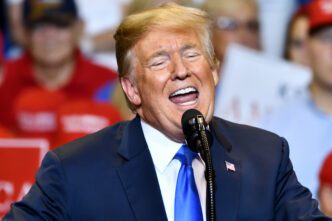President Donald Trump recently launched a sharp verbal attack on ABC News correspondent Mary Bruce during an Oval Office photo opportunity with Saudi Arabia’s Crown Prince Mohammed bin Salman, following questions regarding the 2018 murder of journalist Jamal Khashoggi and potential business conflicts of interest. Trump suggested that the Federal Communications Commission (FCC) should consider revoking ABC’s license, a claim that misrepresents the FCC’s regulatory authority over national networks.
Presidential Remarks and Media Response
During the meeting on Tuesday, Trump repeatedly objected to Bruce’s questions, calling her “insubordinate” and labeling ABC News as “fake news” and a “crappy company.” He asserted that FCC Chairman Brendan Carr should “look at” punishing ABC over its coverage, stating, “I think the license should be taken away from ABC because your news is so fake and it’s so wrong.”
Bruce’s questioning focused on the appropriateness of the President’s family conducting business in Saudi Arabia and the U.S. intelligence community’s conclusion that Prince bin Salman orchestrated Khashoggi’s murder. She also highlighted the anger of 9/11 families over the Crown Prince’s presence in the Oval Office.
Trump dismissed Khashoggi as “extremely controversial” and claimed he had “nothing to do with the family business.” Prince bin Salman, for his part, stated that Khashoggi’s murder had “been painful for us in Saudi Arabia” and defended the Saudi investigation into the crime.
Context of Press Freedom
The incident occurred as Trump sat beside the Saudi Crown Prince, whose country, according to Reporters Without Borders, lacks independent media and subjects journalists to heavy surveillance and strict state control. This dynamic led some observers to note the intertwining of Trump’s frequent disdain for journalists and his admiration for authoritarian leaders.
Sarah Leah Whitson, executive director of Democracy for the Arab World Now (DAWN), a non-profit founded by Khashoggi, suggested that Trump’s comments reflected his belief that “the press is there to be subservient to him, to shut up when he demands they shut up when he finds the question embarrassing.” Karen Attiah, who edited Khashoggi’s columns for The Washington Post, described Trump’s remarks about the slain journalist as “absolutely vile.”
Regulatory Implications and Reactions
While Trump suggested revoking ABC’s license, the FCC primarily regulates the licenses of local TV and radio stations, not national networks. His repeated threats to revoke licenses would constitute a significant departure from decades of precedent and likely trigger extensive legal challenges.
Senator Ed Markey (D-Massachusetts) criticized Trump’s actions on X, calling them “Thin-skinned. Weak. Un-American. Authoritarian.” The National Press Club issued a statement warning that Trump’s minimization of Khashoggi’s murder could have “real-world consequences,” potentially emboldening those who seek to silence reporters and undermining the principle of journalists working without fear of retribution.
The exchange underscores ongoing tensions between President Trump and the press, particularly when addressing sensitive foreign policy matters and human rights issues.








